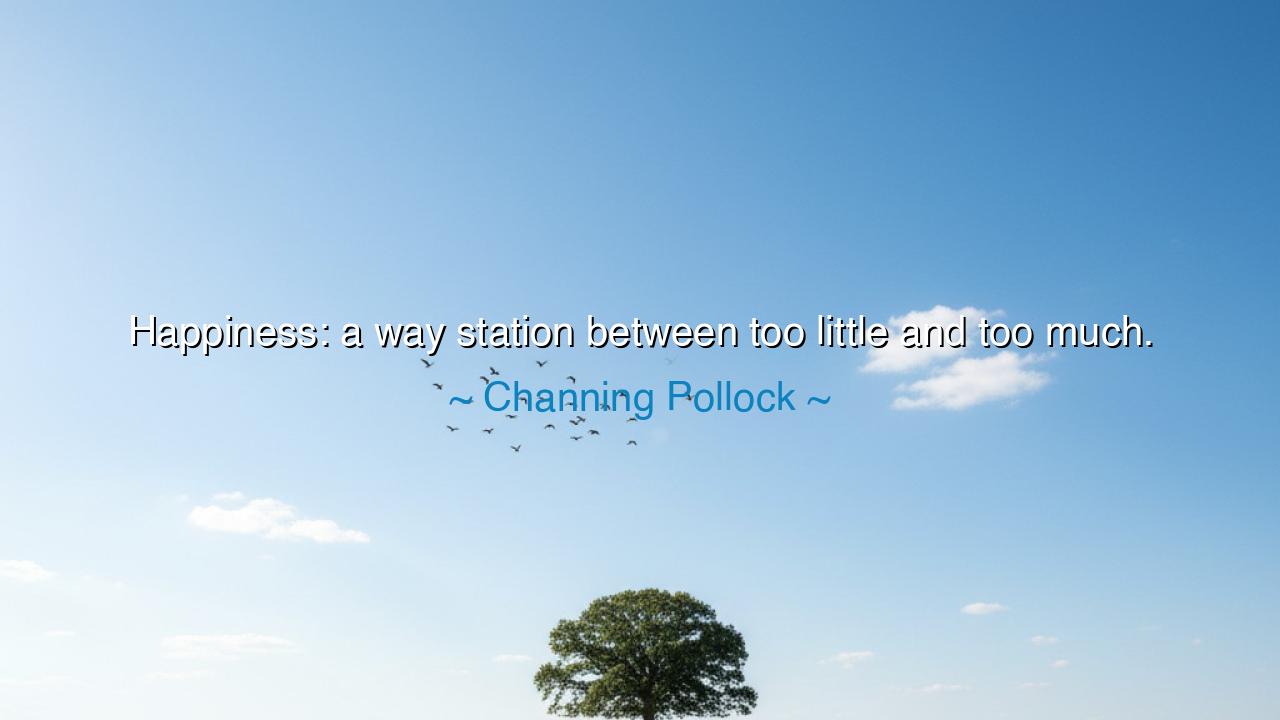
Happiness: a way station between too little and too much.






“Happiness: a way station between too little and too much.” Thus spoke Channing Pollock, the dramatist and philosopher of the early twentieth century, whose insight captures the eternal balance of the human soul. In this brief yet profound reflection, he reveals that happiness is not found in extremes, nor is it a permanent state of bliss, but a moment of harmony — a resting place between need and excess, desire and contentment, poverty and indulgence. His words remind us that joy is not the possession of all things, but the peace that comes when we have enough — when the hunger of the heart and the weight of abundance are both quieted by balance.
The origin of this truth lies in the ancient philosophy of moderation, a principle that echoes through the wisdom of civilizations. The Greeks called it sophrosyne — temperance, self-control, and harmony of the soul. Aristotle himself taught that virtue lies in the mean, the middle path between two vices — the one of deficiency and the one of excess. Courage lies between cowardice and recklessness; generosity between stinginess and extravagance; and happiness, as Pollock declares centuries later, lies between too little and too much. To have too little is to suffer want, but to have too much is to be enslaved by desire. The heart finds its freedom in moderation — in that sacred middle ground where gratitude replaces greed and simplicity nourishes peace.
Pollock’s insight was not born in ease but in observation. Living through the changing tides of modern life — the rise of materialism, the obsession with luxury, the discontent of the restless — he saw how the human spirit was often crushed not by scarcity, but by excess. Man, he realized, could starve from both sides — from lack and from overindulgence. For just as famine consumes the body, abundance can consume the soul. Thus, he likened happiness to a way station — a momentary stop on the journey of life, a place of rest where we can breathe and be content before the winds of desire carry us onward again. It is not a destination to be conquered, but a fleeting harmony to be cherished.
History itself bears witness to this truth. Consider the story of King Midas, whose every touch turned to gold. At first, he rejoiced in his power; soon, he starved, unable to eat or embrace the ones he loved. His curse was not misfortune, but too much — the endless hunger for more. In contrast, think of Diogenes, the philosopher who lived in a simple barrel, owning nothing but his freedom. When Alexander the Great offered him anything he desired, Diogenes replied, “Stand out of my sunlight.” He had found enough, and in that enough, he found peace. Between Midas’ golden torment and Diogenes’ humble serenity lies Pollock’s way station — the place where one’s needs are met and the heart rests in gratitude.
The wisdom of “too little” and “too much” applies not only to wealth, but to every part of human life. To work endlessly is to burn the soul, yet to be idle is to waste it. To love without restraint can lead to blindness, yet to guard the heart too tightly leads to loneliness. To seek constant pleasure leads to emptiness, yet to reject joy entirely leads to despair. Thus, happiness arises not from extremity but from balance — the art of knowing when to strive and when to rest, when to speak and when to be silent, when to give and when to let go. This balance is delicate, but in finding it, man becomes whole.
Happiness, then, is not a constant flame but a momentary glow — the warmth that comes when desire and gratitude meet in harmony. It is the sigh after labor, the smile after forgiveness, the quiet after turmoil. Those who chase happiness as a permanent state are like travelers who mistake the way station for the final city; they will wander forever. But those who understand it as a fleeting grace will pause to enjoy it fully, knowing it cannot be held, only experienced. True wisdom is to live in such a way that these pauses become frequent, that the heart learns to dwell often in the middle ground of contentment.
Therefore, my children, take this lesson to heart: seek balance in all things. Do not despise the small blessings, nor be consumed by great ambitions. Let your table hold enough to nourish you, but not so much that gratitude withers. Let your heart desire beauty and purpose, but do not let it become a prisoner of want. For when you learn to dwell between too little and too much, you will find the gentle rhythm of life — the still point where peace abides.
And so, remember the teaching of Channing Pollock: happiness is not an empire to be built, but a resting place to be visited. It is the still pool between the rivers of longing and indulgence, the quiet note between the chords of hunger and excess. Walk wisely, and when you reach that sacred middle ground, do not rush onward. Sit, breathe, and know that for that brief and shining moment, you have arrived at the true heart of happiness.






AAdministratorAdministrator
Welcome, honored guests. Please leave a comment, we will respond soon